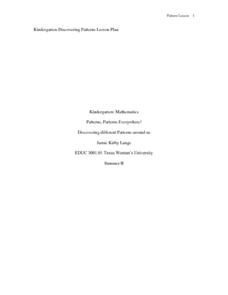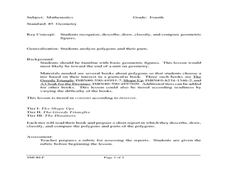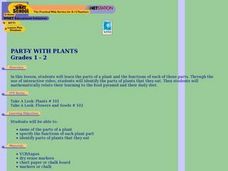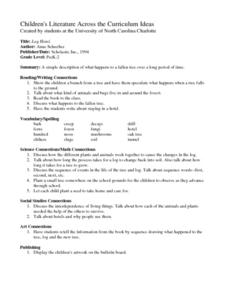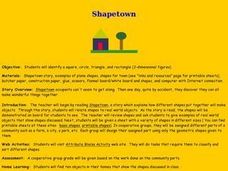Curated OER
Super Shapes Part 2 - Circles
Through the use of Internet, video, and hands-on activities, youngsters learn the parts and characteristics of a circle. This fantastic lesson has some excellent website activities included in the plan. Your kids will have a much greater...
Illustrative Mathematics
What is a Trapezoid? (Part 1)
Challenge your class to construct a definition for trapezoids. Looking at four examples and four non-examples, learners individually create definitions and use them to classify an unknown shape. Allow for small group and whole-class...
Curated OER
Identify Shapes and Matching Parts
Students identify real world objects as shapes they have learned. In this 3-D shapes worksheet, students identify shapes such as a cube for a box, a sphere for a globe, and a cylinder for a soup can.
Curated OER
Book Excerpt from "The 23rd Cycle"
In this solar storms worksheet, students read an excerpt from the book "The 23rd Cycle: Learning to Live with a Stormy Star". Students answer 7 questions about the effects of solar storms on radiation exposure, health risk of airline...
Baylor College
Needs of Plants
What better way to learn about plant life than by creating a class garden? Young botanists start with a brief discussion about radishes before planting seeds and watching them grow. To determine the importance of water,...
Texas Woman’s University
Patterns, Patterns Everywhere!
Not only is pattern recognition an essential skill for young children to develop, it's also a lot of fun to teach! Over the course of this lesson, class members participate in shared readings, perform small group...
EngageNY
Equivalent Ratios II
What is the connection between equivalent ratios? Class members first find the multiplication factor used to create equivalent ratios. Next, they take that information to determine whether ratios are equivalent. The second lesson on...
EngageNY
Mid-Module Assessment Task: Grade 8 Module 4
Determine what the class knows about linear equations. The three-question mid-module assessment is segment 15 in a 33-part series. The assessment includes writing and solving one-variable linear equations and graphing proportional...
Curated OER
Classifying Geometric Figures
Fourth graders recognize and classify geometric figures. In this geometry lesson, 4th graders read the books Shape Up and The Greedy Triangle and prepare a short report on the shapes mentioned in the text. Students compare the...
Curated OER
Sorting
A lesson on classification and sorting is here for you. Elementary schoolers participate in an interactive computer game in which they sort books by theme. They take a trip to the library to observe and discuss how books are sorted, and...
Curated OER
Party with Plants
Students watch a video on plant parts and identify the function of plant parts. In this plants lesson plan, students identify the parts of plants they eat and relate it back to the food pyramid and perform math problems as they do this.
Curated OER
Log Hotel
Students identify how the different plants and animals work together to cause the changes in the log. Students discuss the sequence of events in the life of the tree and log. Students plant a seed to take home and care for. Students...
Curated OER
Stirring up Fractions
Second graders practice unit fractions to identify parts of the whole and parts of a set. They utilize a variety of manipulative's including recipe boxes to get them started stirring up fractions. A multitude of books on fractions are...
Curated OER
Identifying Shapes and Matching
Students recognize shapes and repeating shapes can make a pattern. In this patterns activity, students identify pictures of shapes as patterns or not patterns. Students describe how the pattern is made.
Curated OER
Measuring Body Parts
Learners engage in a lesson to measure body parts. They use the measuring tape to record the data of body measurements. Students must choose the appropriate unit of measurement and compare the data for the different parts of the human body.
Curated OER
Exploring Infinite Sequences, Part II
In this algebra worksheet, students identify the nth term of the sequence. They find the missing term in the pattern and what theorem justifies their choice. There are 12 questions.
Curated OER
Math is Everywhere: Part 2
Second graders identify shapes and measurements in everyday life. In this measurement lesson, 2nd graders locate rectangles in their classroom and use standard and nonstandard forms to measure them. Students view a video clip...
Curated OER
Shapetown
Students identify basic geometric shapes. For this geometry lesson, students read the book Shapetown and identify the various shapes from the story. Students are given a sheet and draw part of a town using only shapes.
Curated OER
3-D Figures Part 1
Elementary schoolers explore 3-D shapes. They transition from thinking of shapes as only 2-D. Pupils read Cinderella as a launching activity for their upcoming adventure, and explore a new world of 3-D shapes in this introductory lesson.
University of Kansas
Newspaper in the Classroom
Newspapers aren't only for reading—they're for learning skills, too! A journalism unit provides three lessons each for primary, intermediate, and secondary grades. Lessons include objectives, materials, vocabulary, and procedure, and...
Institute for Teaching through Technology and Innovative Practices
The Right Number of Elephants
How can you tell if a number of items is reasonable? Combine math and language arts with a fun lesson based on Jeff Shepard's The Right Number of Elephants. After reading the book, kids discuss amounts of other items and create...
Curated OER
Chocolate Math
Students utilize chocolate to identify parts of a whole. In this fractions lesson, students discover the vocabulary associated with fractions and practice dividing a chocolate bar into pieces based on fraction problems....
Baylor College
What's Is Soil Made Of?
It's time to roll up those sleeves and get a little dirty in the second lesson of this series on the science of food. Investigate where plants and animals get the minerals they need to live in this two-part exploration of soil. First,...
Baylor College
Food: The Math Link
Enrich your study of food science with with these math worksheets. They offer a variety of food-related word problems that are great practice for multiplying, identifying fractions, estimating length, and performing calculations...





